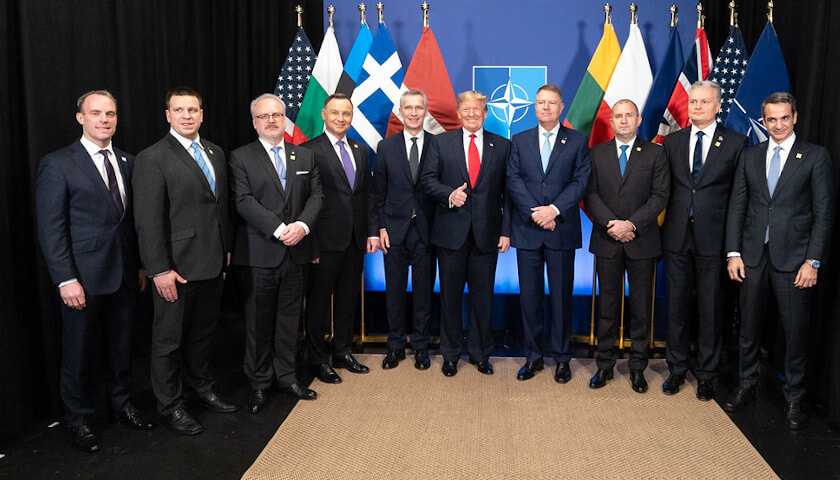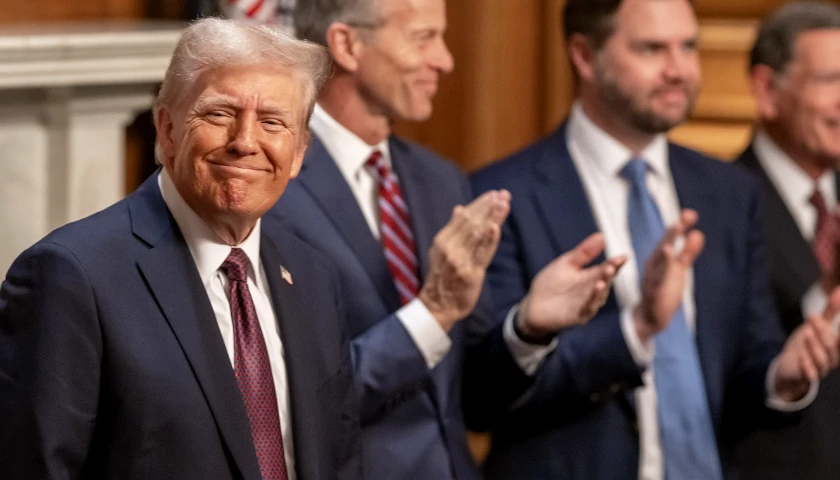by Conrad Black
For a perfect illustration of Europe’s collapse as a serious political force, one could do no better than to read a February 27 article by former German Vice-Chancellor and Foreign Minister Joschka Fischer. In “The West’s Final Countdown,” Fischer warns the U.S. presidential election in November “will have an overwhelming and decisive impact on the future” of all of Western Europe and of the West generally. So far, so clichéd.
Fischer goes on: “The reelection of President Donald Trump could spell the end of the liberal world order and the system of alliances that America has fostered since the 1940s . . . Departing from America’s tradition of global leadership, Trump favors a narrow-minded nationalism, and has shown little restraint in undermining U.S. democracy itself, not least by challenging the separation of powers and other core institutions.”
A Trump reelection victory, this formerly eminent foreign minister advises, would be “a mandate to wreak havoc” and “will fit the description he offered in his first inaugural address: ‘American carnage.’” (Trump was referring, in part, to the devastation of American manufacturing by poorly negotiated trade deals, not the carnage of violent devastation and bloodletting as Fischer implies.)
After this racy intro, it soon emerges that Fischer means this frightful devastation will fall mainly on Western Europe, because “Europe remains almost existentially dependent on the U.S, both economically and for its security. This dependence is a legacy of the twentieth century, with its two world wars and its long Cold War. Such deeply rooted historical realities cannot be easily or quickly reversed. Already, Trump has forced Europe to pursue its own sovereignty; but achieving that end will not come easily or cheaply.”
Thus, it is revealed this feckless slaughter that would be wrought by a Trump reelection would not be the result of overt or deliberate lawlessness, aggression, or hostility by a Trump-led United States. Rather, it would be the continuation of proposals that Western Europe (Fischer is not referring to any of Europe east of Poland and the Baltic states) take greater responsibility for its own defense and economic prosperity.
The proponents of the virtues of Euro-integration, a federal Europe transcending the ancient nation-states between Finland and Portugal and Sweden and Greece (with the now conspicuous absence of the United Kingdom) never ceased to proclaim that their market was larger than that of North America (a dubious assertion even when the British were within it). The American-led victory in the Cold War relieved Western Europe of any serious Russian threat and Britain and France are nuclear powers in their own right with perfectly adequate deterrent forces. French leaders, including three of their last four presidents, the incumbent Emmanuel Macron among them, have spoken of a European army and rapid response force.
These were all pipe-dreams. The Euro-fantasy was based on the fragile supposition that all 27 member countries would cheerfully become provinces of the Commission in Brussels, that the European Parliament would become a serious legislature, and that the whole vast entity would be jurisdictionally homogenized, a mighty resurrection of the Roman and Holy Roman Empires. It hasn’t happened. The British, Europe’s second-largest economy after Germany and most distinguished nationality, have seceded and are gravitating toward North America. Europe itself has flat-lined at minimal economic growth.
So it is not immediately obvious why it is Trump’s fault if Europe is wallowing in uncertainty.
Fischer does decry the fact that Europe is not considering the funding increases that will be necessary if it is to achieve an enhanced state of sovereignty, presumably a reference to increased defense spending, which is one of the policy goals that Trump has been pursuing. Fischer reproaches the European leadership, both in Brussels and in the principal constituent countries, for failing to “adjust to the Trump presidency, the emergence of China as a global power, Russia’s bet on military strength and rearmament, and the rise of the digital economy,” though all of the last three antedated Trump.
Fischer does attack Europe’s “self-interested haggling . . . Strategic thinking and a sense of historical responsibility are, at best, an afterthought.” He then ponders the disappearance of NATO if Trump is reelected.
“Europe certainly wouldn’t be able to manage its own security,” he writes. “The EU must ask itself if it is prepared to do what is necessary to remain an independent player. . . . Otherwise, Europe’s viability as a democratic, sovereign entity in control of its own destiny will be called into question.”
But at no point does Fischer explain why any of this is Trump’s fault. If reelected, Trump would be “fully convinced that he is the ‘chosen one,’ having withstood perfidious attacks by the opposition, the old establishment, the media, and the ‘deep state.’ Who would be left to stop him, or at least chasten him?”
This is the level of utter incoherence to which the European leadership has been reduced: “European sovereignty” appears to be defined as maintaining dependence on the United States, economically and militarily. This is a novel definition of sovereignty and is precisely what Trump has said the United States will not tolerate any longer.
The old European idea of the United States dutifully doing the work and paying the bills while Europe gives the orders won’t fly anymore. This is not the end of European sovereignty—it is the invitation of the United States for Europe to assume its sovereignty and to become a fully paid-up ally of the United States.
The idea of Germany raising its military above its present anemic levels, doing the necessary to resume its status as an economic leader, which means discarding the green strangulation of commerce for which Fischer as the German Green Party leader was partially responsible, is an invitation to Germany to become Europe’s leader and to become a useful ally and not just a whining freeloader. It is a shame that a serious German political leader of the recent past, who was a competent foreign minister, would wring his hands and hurl epithets at the American president when Germany is invited to slough its collective neuroses about its history and its European role and, in close cooperation with the Americans, British, and other prominent democracies, lead Europe toward the renascence of the continent’s political significance. This is what the United States, under this and previous presidents of both parties has suggested, and Trump is doing something about it.
Instead of simpering and contemplating the end of Western Civilization, Germany should seize its opportunity and become Europe’s leader again for the first time since the irresponsible Emperor Wilhelm II fired Chancellor Bismarck in 1890, starting the world on the road to world wars, Communism, Nazism, and the Cold War, all of which required immense American effort and sacrifice to deal with satisfactorily.
In elaborating the sovereignty of Europe, there is no substitute for the Europeans; Germany cannot be governed from the White House and should not wish to be. It is time for the Germans and French, now that the British have washed their hands of Euro-shilly-shallying, to remember how respectable Great Powers govern themselves and discharge their obligations as allies.
– – –
Conrad Black has been one of Canada’s most prominent financiers for 40 years, and was one of the leading newspaper publishers in the world as owner of the British telegraph newspapers, the Fairfax newspapers in Australia, the Jerusalem Post, Chicago Sun-Times and scores of smaller newspapers in the U.S., and most of the daily newspapers in Canada. He is the author of authoritative biographies of Franklin D. Roosevelt and Richard Nixon, one-volume histories of the United States and Canada, and most recently of Donald J. Trump: A President Like No Other. He is a member of the British House of Lords as Lord Black of Crossharbour.





